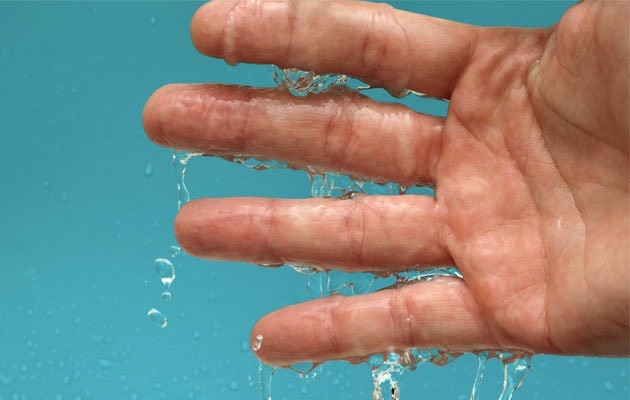Best Dermatology Approaches for Sweaty Hands Treatment: Tips and Techniques
Best Dermatology Approaches for Sweaty Hands Treatment: Tips and Techniques
Blog Article
Comprehending the Origin of Excessive Sweating and Its Impact on Every Day Life
Excessive sweating, additionally called hyperhidrosis, is a problem that impacts a substantial section of the populace, yet its underlying causes and effects on day-to-day functioning stay rather enigmatic. While it is generally understood as a physiological action to manage body temperature level, the triggers for excessive sweating can vary commonly amongst people, incorporating not just physical factors but mental and additionally psychological components. Furthermore, the impact of this condition extends beyond mere discomfort, typically influencing social interactions and general lifestyle. By delving right into the origin of hyperhidrosis and discovering its diverse impacts, a much deeper understanding of this pervasive problem can be acquired, dropping light on the complexities that individuals grappling with excessive sweating navigate daily.
Physiology of Sweat Glands
The guideline of sweat production, a crucial physical process, is largely managed by the activity of gland distributed throughout the human body. Gland are categorized right into two major types: eccrine and apocrine glands. Eccrine glands are one of the most various and are located in mostly all areas of the body. They play a crucial role in thermoregulation by secreting a watery liquid onto the skin's surface, which vaporizes and helps cool the body down. In comparison, apocrine glands are concentrated in locations rich in hair follicles, such as the underarms and groin, and their secretions are thicker and milky in look.
When the body temperature climbs, either due to physical task, high temperature levels, or emotional tension, the nerve system sets off the gland to generate sweat. This sweat is composed mainly of water and electrolytes like salt and chloride. The procedure of sweat production is vital for keeping the body's internal temperature within a narrow, ideal array, highlighting the critical function sweat glands play in human physiology.
Triggers for Excessive Sweating
In recognizing the origin of excessive sweating, it is vital to recognize the triggers that can bring about this physiological response. Extreme sweating, likewise referred to as hyperhidrosis, can be triggered by numerous variables, both ecological and physical. One usual trigger is psychological stress or anxiety, which can stimulate the body's sweat glands to produce more sweat than is necessary for cooling. Physical exertion, high temperature levels, and spicy foods are additionally recognized to cause too much sweating in people vulnerable to this problem. Certain clinical problems like menopause, hyperthyroidism, or diabetes mellitus can contribute to too much sweating as well.
Furthermore, drugs such as some antidepressants, opioids, and specific supplements can also work as triggers for hyperhidrosis. Comprehending these triggers is vital in handling too much sweating successfully - Treatment for hyperhydrosis of hands. By determining and resolving the certain triggers that prompt extreme sweating in an individual, doctor can create customized therapy plans to ease this condition and enhance the person's lifestyle
Medical Issue Associated
Linked with excessive sweating are various clinical conditions that can worsen this physiological reaction. One usual problem is hyperhidrosis, a disorder defined by extraordinarily enhanced sweating that surpasses the body's thermoregulatory demands. This can manifest in focal areas like the hands, soles, underarms, or face, influencing an individual's lifestyle because of social shame and pain.
Furthermore, endocrine disorders such as hyperthyroidism, diabetes mellitus, and menopausal warm flashes can likewise lead to excessive sweating. Hyperthyroidism creates an overflow of thyroid hormones, accelerating metabolic rate and causing sweating.
Additionally, infections like hiv, consumption, and endocarditis have been related to evening sweats, a common signs and symptom understood to disrupt rest and impact overall wellness. These medical problems highlight the diverse array of underlying aspects that can contribute to too much sweating, requiring thorough analysis and administration by medical care experts.
Psychological and psychological Factors

Impact on Social Communications
Too much sweating can have profound results on an individual's capacity to engage easily in social interactions. The noticeable indicators of sweat spots or damp patches on garments can lead to humiliation and self-consciousness, creating individuals to take out from social situations. This withdrawal can affect partnerships, limit social activities, and prevent specialist and personal growth.

Furthermore, the stress and anxiety and self-confidence concerns stemming from excessive sweating straight from the source can affect communication Full Article and social abilities. People may struggle to concentrate on discussions, take part in team tasks, or express themselves confidently. This can result in feelings of isolation and solitude, as social links end up being testing to preserve.
Verdict

While it is typically understood as a physiological response to manage body temperature level, the triggers for extreme sweating can vary widely among people, including not only physical factors however emotional and additionally emotional elements. By diving right into the root causes of hyperhidrosis and discovering its diverse effects, a much deeper understanding of this prevalent issue can be gained, losing light on the complexities that individuals grappling with too much sweating navigate on a daily basis.
Physical physical effort, high temperatures, and spicy foods are also recognized to set off excessive sweating in people prone to this problem. By determining and addressing the details triggers that trigger excessive sweating in a private, healthcare providers can create customized therapy plans to relieve this condition and boost the individual's top quality of life.
Excessive sweating can have extensive effects on a person's ability to engage comfortably in social interactions.
Report this page